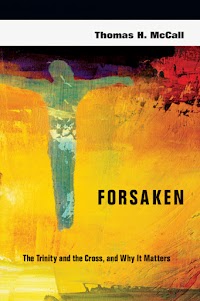
2012 Lenten Reflection Series
While prayerfully considering Why Does God Suffer?, I came across advance material from Thomas H. McCall’s Forsaken: The Trinity and the Cross, and Why It Matters (InterVarsity, May 2012). With the excerpt, InterVarsity Press Academic posted two questions on G+:
- Was Jesus forsaken on the Cross?
- What are the implications of the answer?
Below’s an edited version of what I shared.
Was Jesus forsaken on the Cross? Yes, but it’s important to define how Jesus was forsaken on the cross. I appreciated what Thomas H. McCall shared from Peter Lombard:
His answer is simple and straightforward: the Father abandoned the Son to this death, at the hands of these sinful people, on this cross, “So let us profess that God abandoned that man to death in some way, because for a time he exposed him to the power of his persecutors; God did not defend him by displaying his power so that he would not die. The Godhead severed itself because it took away its protection, but did not dissolve the union; it separated outwardly so that it was not there to defend him, but it was not absent inwardly in regard to the union” between Father, Son and Holy Spirit (46).
What are the implications of the answer? As with the Israelites in the desert, the life of David, the divided kingdom, the life of Jesus’ disciples (New Testament times through today), God doesn’t just snap his fingers and take away the consequences of evil. In agreement with Henri Blocher’s Evil and the Cross: An Analytical Look at the Problem of Pain, “at the cross evil is conquered as evil” (InterVarsity Press. 1994, 131).
God is patient. He reverses what appears to be the victory of evil in the cross, by letting the hollow nature of evil’s* “power” to be revealed by its inability to overcome the righteousness of the sinless sacrifice of the Jesus the Christ/Messiah — the very Son of God (2nd person of the God-head). The Father let the Son endure humiliation, pain, suffering, and death, creating the space for resurrection life to shine forth (e.g., 1 Corinthians 15:1-58). The abandonment of Aslan on the Stone Table serves as an excellent illustration of this truth/reality.
Last week the PSU-Hershey CMS/CMDA Bible study’s consideration of Philippians 2:1-11 led to a humbling of those present. Our lack of our humility, in comparision to Jesus, led to confession/prayer followed by worship of Jesus Christ our Lord/Savior who gives the gift of grace for us to draw close to God. The question of the Son’s wrestling on the cross and the Father’s relationship to the Son, has come up several times in my own journey and with students with whom I have walked alongside through issues of pain, suffering, and rejection.
The material from Peter Lombard appears to be just a glimpse of a rich collection of material cited by McCall in Forsaken. Thank-you to InterVarsity Press for publishing Forsaken. I’m placing my order, wishing it was available in time for Lenten/Holy Week reading, meditation, and prayer.
*i.e., Satan, corrupted state, loss of faith of the religious leaders of the people of God.
What are your thoughts? Feel free to disagree/correct my initial response to excerpts of McCall’s Forsaken. To dig into the topic further, how do you respond when friends ask:
- Why is there evil in the world?
- Why does a good God allow evil?
ESN Blog posts tagged:
2012 Lenten Reflection Series
- Entering Lent: “I Want” in Higher Education (2/23/2012)
- Lent brings me back to reflections on loss, grief, suffering (3/1/2012)
- Why does God suffer? (3/8/2012)
- Was Jesus Forsaken? (3/15/2012)
Updated: 3/15/2014, 11:49 am.
Tom enjoys daily conversations regarding living out the Biblical Story with his wife Theresa and their four girls, around the block, at Elizabethtown Brethren in Christ Church (where he teaches adult electives and co-leads a small group), among healthcare professionals as the Northeast Regional Director for the Christian Medical & Dental Associations (CMDA), and in higher ed as a volunteer with the Emerging Scholars Network (ESN). For a number of years, the Christian Medical Society / CMDA at Penn State College of Medicine was the hub of his ministry with CMDA. Note: Tom served with InterVarsity Christian Fellowship / USA for 20+ years, including 6+ years as the Associate Director of ESN. He has written for the ESN blog from its launch in August 2008. He has studied Biology (B.S.), Higher Education (M.A.), Spiritual Direction (Certificate), Spiritual Formation (M.A.R.), Ministry to Emerging Generations (D.Min.). To God be the glory!

I’m fine with the short point in time and the man, Jesus. But we must also say something about the dominance of Isaiah 53 in the minds of apostolic writers. ‘It pleased Yahweh to bruise and put him to grief and make his soul an offering for sin’ etc. I know at a not so long past GFM staff conference the guest speaker said he *knew* that point in time had nothing to do with the ‘wrath of God’, a concept he apparently rejected. His saying so didn’t make it so. What of propitiation? What of he who knew no sin becoming sin for us? And Habakkuk 1:13 and YHWH’s eyes too pure to look upon evil? I realize it is not the only significant part of the atonement but to leave it out in this discussion (did I miss it?) troubles me. Did that break the silence? 🙂